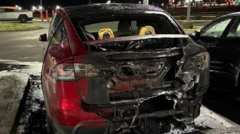Recent findings from the Mexican Attorney General contest accusations of an extermination camp at a western ranch, affirming its use as a cartel training facility without proof of cremation activities.**
Mexican Attorney General Disproves Cremation Claims at Infamous Ranch**

Mexican Attorney General Disproves Cremation Claims at Infamous Ranch**
Investigations reveal ranch served as a cartel training site, but no evidence found of human cremations.**
In a significant development, Mexico's Attorney General Alejandro Gertz reported on Tuesday that investigations into Izaguirre Ranch in Teuchitlán, Jalisco, have revealed no evidence of human cremations despite previous claims that it was an "extermination camp." This ranch had been highlighted by multiple searching groups representative of missing persons, citing the discovery of burnt remains and personal items as signs of horrific activities carried out there. However, during a press conference, Gertz emphasized that the ranch was conclusively established as a recruitment and operations hub for the notorious Jalisco New Generation Cartel, one of the gravest threats to security in the region.
While slight bone fragments were collected from the site, analysis conducted by a university in Mexico City found that the temperatures recorded at the ranch did not exceed 200 degrees Celsius. Gertz clarified that the extreme heat required for cremation typically exceeds 800 degrees, thus invalidating earlier assumptions regarding cremation taking place at the site. The attorney general acknowledged that previous statements suggested there were indications of cremation based on human remains, but he built a case around testimonial evidence and documentation of the cartel's operations.
In contrast, Mexico’s security minister, Omar García Harfuch, previously reported that individuals who resisted the cartel’s training or attempts to escape faced deadly consequences, indicating operations were underway with brutal finality. The revelation highlights a pivotal moment in ongoing investigations into cartel-related violence and human rights abuses in Mexico.
While slight bone fragments were collected from the site, analysis conducted by a university in Mexico City found that the temperatures recorded at the ranch did not exceed 200 degrees Celsius. Gertz clarified that the extreme heat required for cremation typically exceeds 800 degrees, thus invalidating earlier assumptions regarding cremation taking place at the site. The attorney general acknowledged that previous statements suggested there were indications of cremation based on human remains, but he built a case around testimonial evidence and documentation of the cartel's operations.
In contrast, Mexico’s security minister, Omar García Harfuch, previously reported that individuals who resisted the cartel’s training or attempts to escape faced deadly consequences, indicating operations were underway with brutal finality. The revelation highlights a pivotal moment in ongoing investigations into cartel-related violence and human rights abuses in Mexico.






















